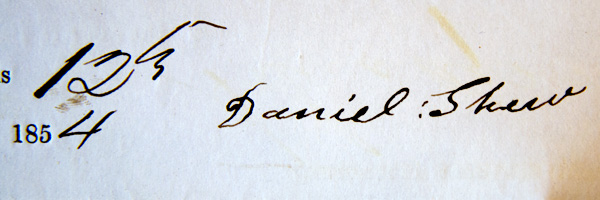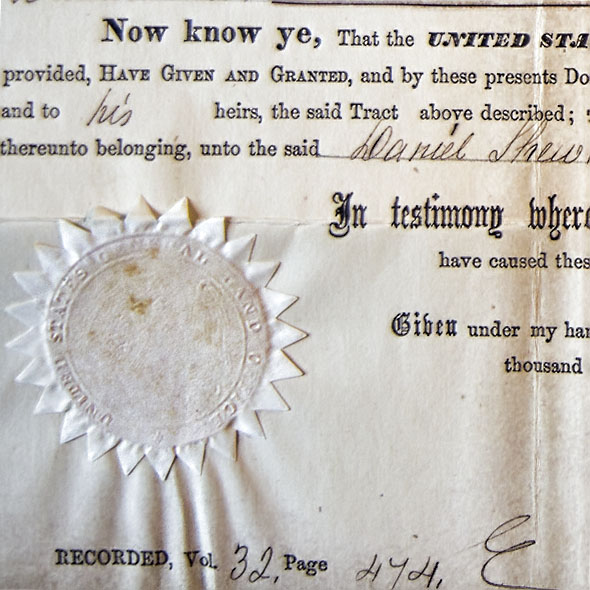Pieces of the past
It’s a feeling like no other in genealogy. It’s a combination of joy… and amazement… and awe. There’s a sense of tangibility to your family history, of connection to your past, that nothing else can bring.
 It’s that moment when you hold history in your hand.
It’s that moment when you hold history in your hand.
For some, it will be a family Bible. There are none of those in my family, on either side, that have been owned and written in by my direct forebears.
For others, it may be a letter, or a diary. Again, for my family’s distant past, there are none of those for me. Most of my ancestors were poor, most uneducated, many unable to read or write, some unable even to sign their names.
So for my family it’s records, held in public archives, carefully preserved as part not just of my family history, but of the history of this nation. It’s one of many reasons why I am so personally committed to the fight to protect access to records in our public archives.
For I have been graced by so many of those moments, when I have held history in my hand.
In the North Carolina State Archives, there is a petition dated the 22nd of October 1790, addressed to the General Assembly of the State of North Carolina. In it, my fourth great grandfather David Baker explained that “he had his dwelling house and every part and parcel of his house hold furniture together with all his Papers Consumed by fire on the night of the Twenty fifth day of December 1787,” and he asked the Legislature to make good for soldiers and jury certificates that had been burned in the fire.1
The Legislature reimbursed him for the jury certificates but the soldiers certificates were for his service in the Continental Line in the Revolutionary War and he was told to seek help from the federal government on those.2

You can’t help but sit there with that document in your hand and carefully, delicately, trace David’s signature with your fingertip… and mourn the family’s losses in that Christmas Day fire of 1787.
Seventy years after David’s petition, another fourth great grandfather, Boston Shew, was struggling to try to establish and support a very young second family in Arkansas.3 To do that he bought land from the federal government.
His file, held in the National Archives, contains this priceless document — his affidavit that he was actually settling on and cultivating the land.4

We’re not sure what happened to Boston and his second wife; his sons by that marriage were back in Cherokee County, Alabama in 1870.5 That may explain why Boston never picked up the actual patent for his land. That too is in his file.6

Boston’s son, my third great grandfather Daniel Shew, also bought land from the federal government, but some years earlier back in Cherokee County. His file contains his signature on an affidavit swearing that — including this land transaction — he wouldn’t have received more than 320 acres under the act of 4 August 1854.7

Exactly when and where Daniel died is also something we don’t know. But his widow Margaret was enumerated alone with their three children in the 1860 census.8 That may explain why Daniel didn’t pick up his patent either. 9

You can’t help put sit there and carefully, gently, run your fingers over the raised seal at the bottom of the page.
And rejoice at holding history in your hand.
SOURCES
- North Carolina General Assembly, Joint Papers of the Committee of Propositions and Grievances, November 6-20, 1790, Report in Favor of David Baker (with Petition and Deposition), call no. GASR Nov-Dec 1790, Box 2; North Carolina State Archives, Raleigh. ↩
- Ibid. ↩
- 1860 U.S. census, Izard County, Arkansas, Franklin Township, population schedule, p. 349 (stamped), dwelling 150, family 148, Boston Shew household; digital image, Ancestry.com (http://www.ancestry.com : accessed 5 Oct 2012); citing National Archive microfilm publication M653, roll 43; imaged from FHL microfilm 803043. ↩
- Affidavit for Actual Cultivation and Settlement, 27 Feb 1860, patent no. 18,264, final patent date 1 October 1860, in Boston Shew (Izard County, Arkansas) land entry file, Batesville, Arkansas, Land Office; Land Entry Files, Arkansas; Records of the Bureau of Land Management, Record Group 49; National Archives, Washington. ↩
- 1870 U.S. census, Cherokee County, Alabama, Leesburg, population schedule, p. 268(B) (stamped), dwelling/family 23, B and J D Shoe in R M Hale household; digital image, Ancestry.com (http://www.ancestry.com : accessed 5 Oct 2012); citing National Archive microfilm publication M593, roll 7; imaged from FHL microfilm 545506. ↩
- Patent no. 18,264, in Boston Shew (Izard Co., Ark.) land entry file. ↩
- Affidavit, 12 Oct 1854, patent no. 17,317, final patent date 1 January 1859, in Daniel Shew (Cherokee County, Alabama) land entry file, Lebanon, Alabama, Land Office; Land Entry Files, Alabama; RG 49; NA-Washington. ↩
- 1860 U.S. census, Cherokee County, Alabama, population schedule, p. 315 (stamped), dwelling/family 829, Margaret Shoe household; digital image, Ancestry.com (http://www.ancestry.com : accessed 5 Oct 2012); citing National Archive microfilm publication M653, roll 5; imaged from FHL microfilm 803005. ↩
- Patent no. 17,317, in Daniel Shew (Cherokee Co., Ala.) land entry file. ↩



Like you, I only have legal signatures from my Laurens County (Petty)Pool family- with two exceptions. On two occasions, the legal scribe took care to record exact quotes from my ancestors:
My third great grandfather – “You (meaning the said Harmon Waldrop) swore a lie.” Laurens Court of Common Pleas, 1825, Seth P. Poole, #2157.
My second great granduncle- He lost a slander case for calling Polly Gentry “a whorish b***h” and ” a mulatto strumpet”. Peter Pool vs. Allen Gentry & Wife, 1831, Court of Common Pleas, Judgment 2962.
Okay, despite the somewhat Shakespearean ring of Peter’s insults, I admit they are not the most wholesome of quotations to ring down through the years, but there they are- two Pettypool’s of Laurens County, SC speaking their minds.
You just have to love that, Jim! Great stuff!
There is NOTHING like holding history in your hand! When I saw the original marriage certificate for my 2nd great grandparents from 1864, I had to force myself not to grab it and run from the building! I’ve recently discovered family treasures from 150 years ago and every time I touch something, I have to stop to think about who else touched it and where it has been. There is a certain calmness that comes over me when I think about the fact that my ancestors touched the same paper or object that I am touching.
That sense of connectedness, Debi… it’s just so amazing.
I had such a moment when I held the will of my husband’s fourth great-grandfather written in 1855. He had a modest estate but he provided for his wife and left money to his adult children who except for one were married with families. What really got me was when he made specific provision for the care of his “insane son”. He appointed his wife as this young man’s guardian and also made provision for him financially. This really touched us because our youngest son is disabled. It’s comforting to know that he was the kind of man who wanted to make sure his son would be taken care of.
That’s really wonderful, Pat. And what a joy to be able to hold that document!
A question about patent and the petition. Would every patent have an accompanying petition? I ask because my second great grandfather also received a land patent very similar to yours. It is worded very much like yours is although mine was written up during the administration of Chester Arthur. I got a copy of the patent from the BLM website. So, I just wonder if there is a petition “floating” around somewhere with his signature on it.
It’s essentially guaranteed that some additional documents will exist, all held by the National Archives in Washington DC. You can order a copy of the file, which can be expensive if it’s just a few sheets of paper. You might want to check the APG and BCG directories to see if there’s a professional genealogist who works in the area and can retrieve the file for you for less than NARA will charge to copy it and send it.
>a professional genealogist who works in the area and can retrieve the file for you for less than NARA will charge to copy it and send it.
Any idea on what that might be? I don’t need an exact figure, ballpark would be ok. Btw, what did it cost you if I might ask?
The current fee is $50 for each file, even if it’s two pieces of paper.
Ok. In your example, it would cost me $100?
If I were to get a genealogist in the area to do for me, how much do you think it might cost? A (very) wild guess would do.
Btw, I went to the website and you’re right. It would cost $50 per. I also saved an order just in case.
Yes, in my example, there were two land files, and each one would have cost me $50. Both were cash sales and so there were only a few papers in each file (homestead files are usually much more rewarding). Hiring a researcher might well be worth it for you, but I can’t speak to the possible range of costs: it would depend greatly on just what you wanted done and who you chose to work with. However, check your email for a specific thought on this.
I never really thought about the “romance” and shivery realization that we’re holding the actual historical document–history itself–in our hands. But you are right! Two days ago my 3 x g grandfather’s Revolutionary War Voucher came in the mail — I had ordered it from the NC Archives, for my DAR application. There was his signature. I matched it to the one on his will. It was as if he was still living, around the corner somewhere. Although I’ve read about his tribulations in the Black Creek Church minutes, and I’ve catalogued his 13 children on FTM, there is nothing like another concrete, physical trace of him. Thanks for your post!
It’s a wonderful feeling, isn’t it, Mariann? You won’t ever think of that document the same way again.
From the land patent that you have, can you determine if that person get it via the Homestead Act or cash?
I used to think so, but the answer is no. I discovered that with another patent that says it was a cash sale under the act of 1820 — but the statute setting up that particular sale made it subject to the Homestead Act. See Homesteading a cash sale, posted 29 May.
I have state and court house copied docs – though some not originals, the info
they contain on various family members – whether in the USA or overseas are
priceless and a genealogy “happy dance” with their arrival is very special.
eg immigrations records/ bmd/ obits/military/land and property deeds.
GJ
That “happy dance” feeling is something we’ve all felt — and all want to feel more!!